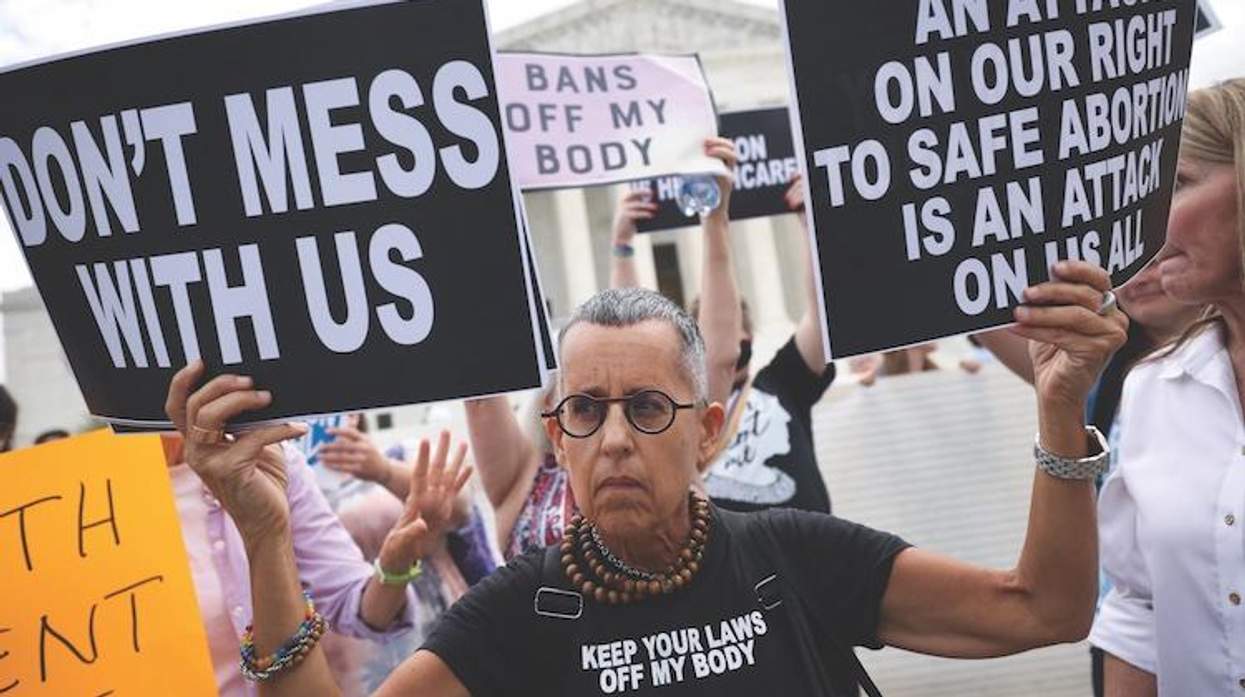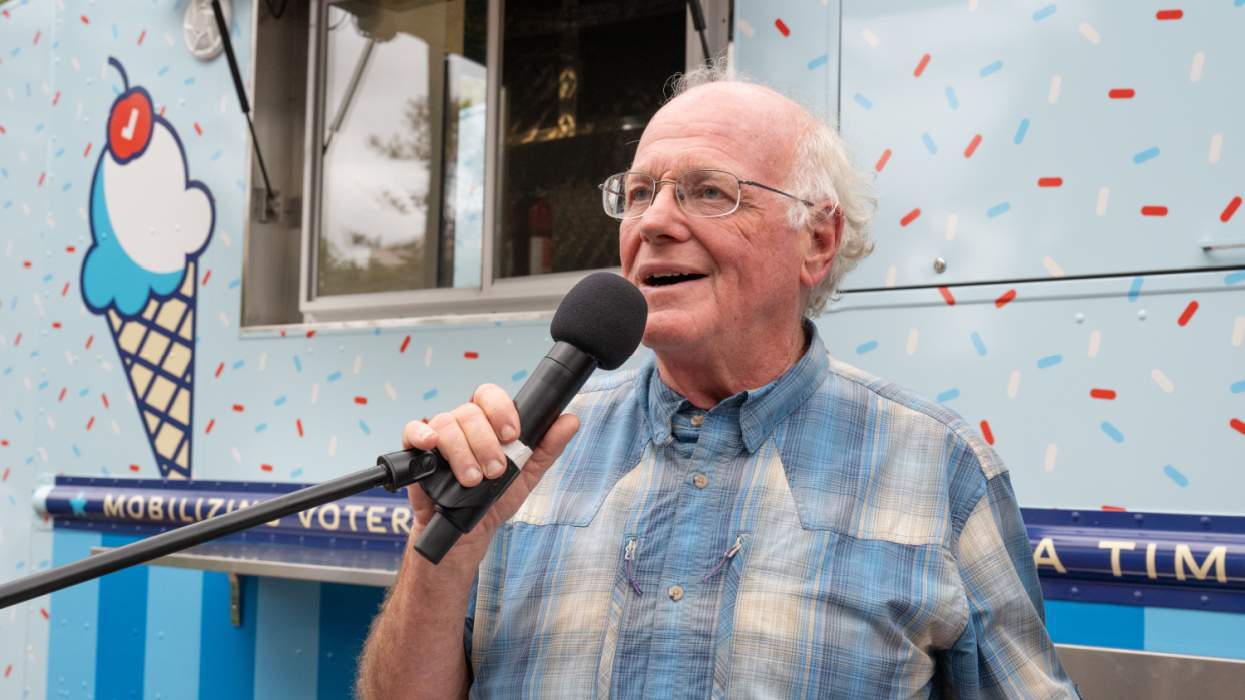Don't think for a minute that the current assault on abortion rights doesn't concern LGBTQ+ people.
The right to abortion is an LGBTQ+ issue, in many ways. LGBTQ+ people can and do become pregnant and sometimes seek abortions. What's more, the right is grounded in the same principles as the freedom to choose one's intimate partners, marry the person one loves, and generally have control over one's body.
Now, with the Supreme Court hearing a case on Mississippi's restrictive new abortion law and refusing to block a Texas law that lets private citizens sue anyone who performs or assists in an abortion (although allowing a court case against the latter to proceed), all those rights are under threat to some extent.
"The connections between LGBTQ equality and reproductive rights are very strong, even if they're not obvious to everyone," says Julie Gonen, federal policy director for the National Center for Lesbian Rights.
"All of this builds from the same foundation about the right to define oneself," adds Sharon McGowan, legal director and chief strategy officer at Lambda Legal.
Roe v. Wade, the 1973 Supreme Court decision that legalized abortion nationwide, was based on the right to privacy. Lawrence v. Texas, in which the court struck down all remaining antisodomy laws in 2003, likewise drew on the right to privacy. Obergefell v. Hodges, the 2015 marriage equality decision, was grounded more in the guarantee of equal protection of the laws -- something the late Justice Ruth Bader Ginsburg said Roe should have been based on.
The state of Mississippi, in defending its law banning most abortions after 15 weeks of pregnancy, has now asked the court to overturn Roe. The court heard oral arguments in the case, Dobbs v. Jackson Women's Health Organization, in December, and is expected to rule in the spring. With a 6-3 conservative majority, the court could indeed overturn Roe, allowing states to ban abortion, or rule more narrowly, setting new standards for what restrictions states could enact. Even a so-called narrow ruling "would be seismic," Gonen says.
Beyond that, far-right forces would be emboldened to further challenge other rights they don't like, including rights to sexual intimacy and marriage. During oral arguments, conservative Justice Amy Coney Barrett asked Mississippi Solicitor General Scott Stewart, who was defending the state's law, if upholding the law would undermine those rights and others. He replied that it would not, and that the decisions establishing these rights "draw clear rules."
Liberal Justice Sonia Sotomayor didn't buy it, saying, "I'm not sure how your answer makes any sense," and LGBTQ+ legal experts aren't buying it either. "Of course it's about marriage and LGBTQ intimacy and so on," says Mary Bonauto, an attorney with GLBTQ Legal Advocates and Defenders, who argued Obergefell before the Supreme Court.
During the arguments, Sotomayor also referred to the "stench" of politicization on the court, while conservative Justice Brett Kavanaugh said Roe might not have to be respected as precedent, as the court has overruled precedent in some other major cases, including Lawrence and Obergefell.
"That is just jaw-dropping," Human Rights Campaign Legal Director Sarah Warbelow says of Kavanaugh's statement. She and others note that when the court has gone against precedent, it's been to expand rights, not take them away.
The good news about the freedom to marry is that it's popular, even though some on the right, including Justices Clarence Thomas and Samuel Alito, would like to see Obergefell overturned. But it's important to stay vigilant about all the rights rooted in privacy, equality, and liberty, the legal experts say, noting that rights to contraception and assisted reproduction could be in the cross hairs as well. One thing everyone can do is to vocally support these rights. And for LGBTQ+ people, being as out as possible can help create allies.
"We are still a minority in this nation -- the way that minorities can protect their rights is to persuade the majority that they should be protected," Bonauto says.
Another key thing, the lawyers emphasize, is to stay informed and to vote -- the 2022 election will determine control of Congress, and then there's the presidential election in 2024. The Supreme Court would look very different if Hillary Clinton had been elected president in 2016 instead of Donald Trump, or if President Barack Obama's last high court nominee, Merrick Garland, had been confirmed that year, but Republicans denied him even a hearing.
Paying attention at the state level is crucial too. Twenty-one states are ready to ban or seriously restrict abortion if Roe is overturned, and many of the same states are hotbeds of anti-LGBTQ+ political activity. People in liberal states need to reach out to those in right-leaning ones in hopes of stopping oppressive legislation, the legal advocates say, and on abortion in particular, Gonen suggests supporting local clinics and abortion funds, which help low-income people pay for the procedure.
On both reproductive rights and LGBTQ+ rights, Warbelow says, it's important to voice support and make sure legislators are hearing. "It's so critically important just to get out and vote," she adds, "and encourage like-minded people to do the same."















Charlie Kirk DID say stoning gay people was the 'perfect law' — and these other heinous quotes
These are some of his worst comments about LGBTQ+ people made by Charlie Kirk.